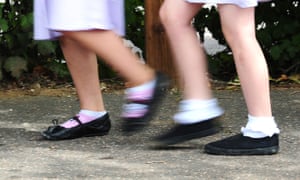
Hundreds of children, including some as young as five, are being expelled or temporarily excluded from school for sexual misconduct including abuse, assault, harassment and watching pornography, according to new figures.
The research reveals that pupils are being disciplined for a wide range of incidents described as sexual misconduct, including bullying and “lewd” behaviour, as well as sharing indecent images on social media.
Figures obtained via a freedom of information request by the Press Association from 15 local authorities found 754 children had been expelled or temporarily excluded from school as a result of sexual misconduct in the past four years.
At least 40 of the cases involved children under 10 – the age of criminal responsibility – and of those, seven pupils were in their first year of school.
This research will once again raise concerns about the scale of sexual harassment and violence in schools following a damning report last year by the Commons women and equalities committee which said schools were failing to tackle the problem effectively.
The government has since committed to making age-appropriate sex and relationships education compulsory, but campaigners remain concerned about a failure in child protection in schools.
Sarah Green, co-director of the End Violence Against Women Coalition, said: “These figures, which reveal really alarming behaviour in schools, show that girls and boys are being failed by those who should protect them and prevent this.
“The Department for Education (DfE), and school leaders and parents, need to take responsibility now for ensuring better child protection, better policies on bullying which recognise sexual bullying, and good relationships and sex education.”
The new data shows that the vast majority of exclusions involved boys – there were 18 incidents of sexual misconduct involving boys for every one incident involving a girl – and most exclusions were on a fixed-term basis, meaning pupils were allowed back in school after a set period, rather than being excluded permanently.
The Press Association figures, though limited to a small number of local authorities, provide an insight into the nature of sexual misconduct in schools and the age of the perpetrators. Most local authorities approached for information either refused to disclose or said they did not keep figures. The data came from Brent, Cornwall, Derbyshire, Devon, Dorset, Durham, Greenwich, Isle of Wight, Leicester, Lincolnshire, Liverpool, North East Lincolnshire, Oldham, Somerset and Wigan.
Government data published last month revealed there were 2,070 fixed-period exclusions for sexual misconduct and 70 permanent exclusions in English schools for the 2015-16 academic year alone, but did not specify the age of children involved or the detail of the conduct.
According to the data published on Wednesday, 14-year-olds were the most likely to be excluded for sexual misconduct (120 cases), with numbers tailing off as children got older.
Javed Khan, chief executive of the children’s charity Barnardo’s, said: “It’s vital all pupils are taught what a healthy relationship looks like so they understand what consent and respect mean.
“Barnardo’s has long campaigned for compulsory age-appropriate lessons on relationships and sex education, and we believe these will help better protect children when they’re finally introduced in 2019.”
An NSPCC spokesman added: “Every child has the right to feel safe at school. Preventing harmful sexual behaviour through proper, up-to-date sex and relationships education is immeasurably better than excluding children after the harm has been done.
“Social media, sexting, online porn and dating apps did not exist when sex education was introduced on the curriculum a generation ago. It must be dragged into the 21st century.”
A Df E spokesman said: “Sexual assault of any kind is an offence and must always be reported to the police. Schools should be safe places and we issue safeguarding guidance to protect pupils’ welfare.
“As announced in March 2017, all primary schools will be required to teach relationships education and all secondary schools will have to teach relationships and sex education in the future.
“We want to help all schools deliver these lessons so that young people are equipped to have healthy relationships and treat each other with respect.”
The women and equalities committee heard evidence that almost a third (29%) of 16-to-18-year-old girls have experienced unwanted sexual touching at school, and nearly three-quarters (71%) of all 16-to-18-year-olds say they regularly hear terms such as “slut” or “slag” used towards girls at schools.
It also heard that in 2014 59% of girls and young women aged 13-21 said they had faced some form of sexual harassment at school or college in the past year.
Source:-.theguardian
